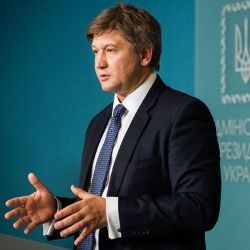Ukraine to Legalize Gambling by Next Year

In February of 2017, the Ukraine government announced that it intended to legalize gambling in order to generate much need revenues for the Eastern European nation. Ukraine Minister of Finance, Oleksandr Danilyuk (photo), subsequently published a letter that was sent to the International Monetary Fund laying out what the government intended to do to reform the country’s economy. Expected to be implemented as early as 2018, the intended changes will lead to a major relaxation in the restrictions imposed on both online and land based casino games in the country, and commenting on the development, Ron van Rooden, the IMF mission chief for Ukraine, stated:
“The economic and social costs of the crisis have been high. The government has undertaken important reforms under very difficult circumstances, but it has to do much more to recover the lost ground, to bring incomes closer to those in the neighboring states, to improve social conditions, and to build a modern market economy.”
Securing IMF Funding
These economic reforms mean that Ukraine will qualify for a significant amount of Financial Assistance from the IMF worth around $17.5 billion, with the country having already received the first installment of this package worth $1 billion. The letter that was sent was signed off by the head of the national bank, the prime minister, the finance minister and the President himself, and stated that Ukraine was committed to its plans of legalizing gambling with the intention of bringing in much-needed revenues.
While optimistic, this is not the first time that the country has tried to legalize national gambling. In 2015, for instance, there was draft legislation introduced that would have permitted a national lottery, sports betting, as well as land-based and online casinos alike. At the time, the government estimated that it would rake in $1.5 billion each year, while more recently, Ukraine Finance Minister Aleksandr Danilyuk said he believed that the government has lost out on $370 million worth of gambling tax revenue by not implementing market reforms over the last two years.
Nevertheless, a few years back casino operators believed that the license fee prices and tax rates were way too high, so this legislation ultimately never went anywhere. The government may not have learnt its lesson in the meantime, either, as it has stated its intention to raise the tax on its state lottery to 18% in 2017, and then 24% in 2018, after which it will increase by 2% each year until reaching an exorbitant cap of 30% by 2021 .
Russian Plans for Crimea
In the meantime, the Russian annexed region of Crimea has plans of its own of becoming a center for gambling activities by opening its market to local and foreign gamblers alike. It has also been noted that the Crimean authorities have been prepared to offer up a game plan strategy to investors in the hope that it will help them bypass many of the sanctions that are necessary in order to get this project off the ground.
Crimean Prime Minister Sergey Aksyonov believes that arrangements can be made to bypass certain sanctions, but has so far failed to provide any details as to what they might be. Aksyonov does think that no one would have expressed their intentions to invest in the project if they had any doubts as to its validity, and as he explained recently:
“There are certain arrangements that will make it possible [for investors] to bypass the sanctions. I will keep quiet about such secrets for now. Nobody will agree to invest in this project if there were doubts this plan might not work.”
The Crimean premier also said that he plans to begin assembly and construction in the health resort of Zhemchuzhina in Yalta later this year, which lies on the Crimea’s south coast by the Black Sea. In July of 2014, Vladimir Putin, the Russian President, signed a law that established a legal gambling zone in Crimea, with its boundary being in Gaspra. It is expected to be enacted by the year 2019, and according to estimates performed by experts, the budget will allow them to receive 25 million rubles in annual gambling revenue.









